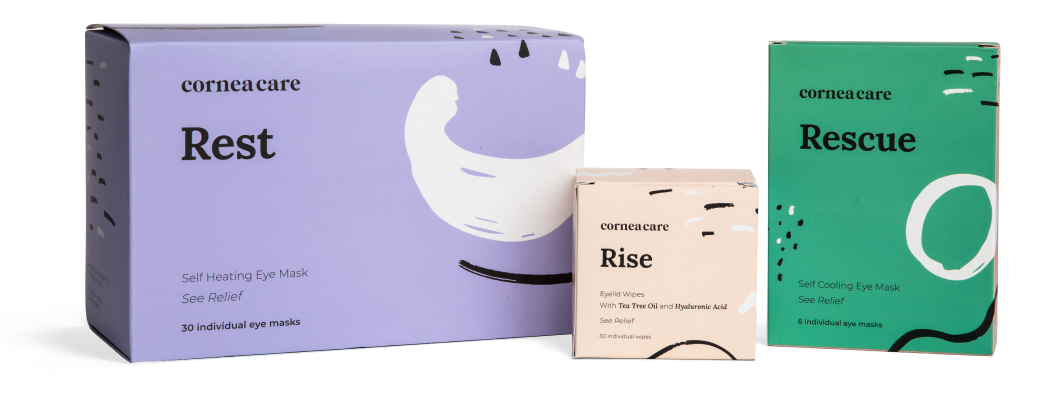What is Laser Eye Surgery for Astigmatism?
When it comes to vision correction, the pursuit of clear sight often leads individuals to explore advanced solutions. With astigmatism, the cornea or lens in your eye has a shape that creates competing focal points, leading to difficulty seeing clearly without corrective lenses. Laser eye surgery, also called refractive laser surgery, employing techniques like LASIK, PRK, and SMILE, can reshape the cornea to correct astigmatism.1
This article explores how laser eye surgery addresses astigmatism, outlines criteria for a good candidate, and discusses potential risks. We’ll also cover the before, during and after phases to help you know what to expect from laser eye surgery.
Key Points
- Astigmatism is defined by an irregular cornea or lens shape, causing blurred or distorted vision to varying degrees.
- Laser eye surgery, a highly effective solution for astigmatism, comes in various types, each with its own unique characteristics and considerations.
- Determining candidacy for laser eye surgery involves factors like stable vision, treatable refractive conditions, and optimal eye health.
Understanding Astigmatism
Astigmatism refers to a refractive error affecting the eye’s ability to focus light. A very common condition, many people have a mild form of astigmatism. Usually, if it’s not too severe, astigmatism doesn’t change how you see and requires no treatment. But if astigmatism makes your vision blurry or distorted, you might need to correct it.2
To grasp the concept of astigmatism, envision a regular eye as uniformly rounded, resembling a ball. In contrast, an astigmatic eye takes on an egg- or oval-shaped form. You may have one of two main types of astigmatism:3
- Horizontal astigmatism means the eye is wider than it is tall
- Vertical astigmatism means the eye is taller than it is wide
Astigmatism often exists along with other eye issues like not being able to see things up close (myopia) or having trouble seeing things far away (hyperopia). Unlike other vision problems, astigmatism isn’t limited to just nearsightedness or farsightedness; instead, it introduces irregularities in the curvature of the cornea or lens, resulting in distorted or blurred vision.2,3
With astigmatism, you might notice symptoms such as:2
- Squinting
- Eye strain
- Blurry vision
- Headaches
- Difficulty seeing clearly at night
Recognizing these signs early on and having regular eye exams is important for maintaining optimal eye health.
While genetics often plays a role, other factors like eye injuries, certain medical conditions, or even improper posture can contribute to the development of astigmatism. Beyond its immediate effects on vision, astigmatism can impact overall eye health. The strain placed on the eyes due to irregular focusing can lead to discomfort and headaches.2
Treatments for astigmatism
While laser eye surgery offers a cutting-edge solution for astigmatism, it’s not the only option available. You have several alternatives to consider:
- Glasses: Traditional eyeglasses, prescribed to correct the specific astigmatic prescription, offer a straightforward and non-invasive solution. Glasses can be a convenient choice, especially for those who prefer not to undergo surgery or want a temporary option before considering more permanent solutions.2
- Contact lenses: Soft or rigid gas-permeable contact lenses are another option for astigmatism correction. For people with an active lifestyle or those desiring a more discreet option than glasses, contact lenses can be an effective solution. However, proper contact lens hygiene and regular eye exams are important for their safe use.2
- Orthokeratology (Ortho-K): This non-surgical option for certain cases of astigmatism, involves wearing specially designed contact lenses overnight to reshape the cornea.2
- Refractive Lens Exchange (RLE) and Toric Lens Implants: Like cataract surgery, these surgical procedures involve replacing the eye’s natural lens with an artificial intraocular lens (IOL) to correct refractive errors. RLE can be combined with laser eye surgery to correct astigmatism.1
- Laser eye surgery: Laser eye surgery is a highly effective and popular solution for addressing the irregularities causing astigmatism. This outpatient procedure offers minimal discomfort and swift recovery. Advanced laser technology provides precise corneal reshaping tailored to individual needs.1,2,3
Consult with your eye doctor (optometrist or ophthalmologist) to determine the most suitable option for addressing astigmatism while aligning with your health goals and preferences.

Rise
Eyelid Wipes
Perfect for eye dryness, itching, burning, and crusting/flaking of eyelashes. Free shipping 📦
Try today - $25
Laser Eye Surgery for Astigmatism
Laser eye surgery can address various degrees of astigmatism, with different lasers and precision levels ensuring optimal outcomes. While laser vision correction primarily targets the cornea, it enhances overall visual clarity. This technology has revolutionized vision correction, offering unparalleled accuracy.
If you’re considering laser eye surgery, it helps to understand the different types of laser eye surgeries:1
- LASIK (Laser-Assisted In Situ Keratomileusis): A widely popular choice, the LASIK procedure involves creating a corneal flap to access and reshape the underlying tissue with an excimer laser. This outpatient procedure is known for its quick recovery and minimal discomfort.
- PRK (Photorefractive Keratectomy): PRK is another laser surgery option where the corneal tissue is reshaped without creating a flap. This may be recommended for individuals with thin corneas, keratoconus, or those at risk of corneal flap complications.
- SMILE (Small Incision Lenticule Extraction): SMILE is a modern and minimally invasive technique where a small incision is made to extract a lenticule, reshaping the cornea. This procedure offers an alternative to traditional methods, potentially with less discomfort and a quicker recovery.
- LASEK (Laser Epithelial Keratomileusis): LASEK is a laser refractive surgery option designed for individuals with thin corneas or those not ideal candidates for LASIK or PRK. In LASEK, a thinner flap of corneal tissue is created and lifted to expose the underlying cornea. The excimer laser is then used to reshape the cornea, correcting refractive errors. While the initial recovery period may be longer compared to LASIK, LASEK can be a more comfortable alternative to PRK.
Each type of laser eye surgery has its unique characteristics and considerations. The choice among these procedures depends on factors such as corneal thickness, individual eye characteristics, and your surgeon’s recommendation.
Candidacy for Laser Eye Surgery
The decision to undergo laser eye surgery for astigmatism is a personal one, influenced by various factors that determine whether you are a good candidate for laser vision correction. To assess your suitability for laser eye surgery, your eye doctor will consider your medical history and other criteria such as:4
- Ideally over the age of 21, with stable vision for a year
- Minimal changes in corrective lens prescription over the past year
- Treatable refractive conditions include nearsightedness, farsightedness, or astigmatism
- Thick corneas and optimal eye health
Conditions that may pose risks for laser eye surgery candidacy include unstable refractive errors, vision issues, dry eye disease, thin or cone-shaped corneas, corneal diseases, cataracts, glaucoma, certain eye infections, injuries, or diseases in your medical history, poorly controlled diabetes, autoimmune disorders, a weakened immune system, regular participation in contact sports, and pregnancy or breastfeeding.5

All Rounder
Eyelid Hygiene Plan 3
Perfect for eye dryness, burning, itching, grittiness, crusting/flaking of eyelashes and inflamed/swollen eyelids. Free shipping 📦.
Try today - $60
Before, During, and After Laser Eye Surgery: What to Expect
Selecting a qualified eye surgeon is an important first step when considering laser vision correction. Knowing what to expect before, during and after LASIK or other laser eye surgery procedures can make the process less stressful and more successful.
Before surgery
Preparing for laser eye surgery properly will contribute to a smoother experience:
- Cost considerations: Laser eye surgery is typically an elective procedure and likely will not be covered by medical or vision insurance. Consult your eye surgeon to understand the expected charges and prepare for associated costs.
- Transportation arrangements: Plan for transportation to and from surgery. Side effects and temporary blurry vision post-surgery make driving unsafe.
- Contact lens pause: Cease wearing contact lenses as advised by your ophthalmologist in the weeks leading up to surgery.
- Maintaining eye hygiene: Keep your eyes clean by avoiding creams, lotions, and eye makeup in the days surrounding laser eye surgery. Using CorneaCare eyelid wipes, warm compresses and cool compresses for good eyelid hygiene may reduce discomfort post-surgery.
Adhering closely to your eye doctor’s recommendations enhances the likelihood of a positive experience.
During surgery
The actual laser eye surgery procedure is a swift and virtually painless experience. Advanced laser technology is used to reshape the cornea with small incisions. The excimer laser, known for its precision, is a cornerstone in procedures like LASIK eye surgery and PRK.2 Your eyes are numbed and each eye typically takes only a few minutes to treat, making the procedure relatively comfortable and stress-free.
After surgery
Discomfort, including watery and itchy eyes with a gritty sensation, is normal after laser eye surgery. While you’ll likely have blurred vision initially, it gradually improves. Your surgeon may prescribe pain medication or recommend eye drops or artificial tears for relief.
Wearing an eye shield while sleeping is advised until complete healing. The first follow-up appointment, 24 to 48 hours post-surgery, is crucial for assessing healing and identifying any complications.4
Maintain good eye hygiene, avoid makeup, creams, and contact sports, and adhere to your surgeon’s recommendations. Ample rest is vital for optimal results, allowing you to return to work within days while reducing eye strain during the initial weeks post-surgery.
Laser Eye Surgery Potential Risks and Complications
While laser eye surgery is generally safe and has a high success rate, there are potential risks and complications to consider. Common side effects, such as dry eyes or temporary visual disturbances, are typically mild and resolve over time. More serious complications, though rare, can include infection or overcorrection.5
Advancements in technology and stringent screening processes have significantly reduced the likelihood of complications. To reduce your risk, be sure to choose a qualified eye doctor, undergo a thorough evaluation, and strictly follow pre- and post-surgery instructions.

Multivitamin
Eye Vitamins & Minerals
A single multivitamin to address the nutritional needs of your eyes, mind and body. 📦 Free shipping.
Try today - $35
Laser Eye Surgery for Astigmatism FAQ
Laser eye surgery is highly effective in correcting astigmatism by precisely reshaping the cornea. This procedure addresses both vertical and horizontal irregularities, improving or eliminating the blurriness associated with astigmatism. While success depends on factors like the degree of astigmatism, laser eye surgery offers lasting results for many.
You may not be eligible for laser eye surgery if you have certain pre-existing eye conditions, such as severe dry eye disease or glaucoma. Additionally, pregnant or nursing individuals may be advised to wait, as hormonal changes can affect vision. Individuals with autoimmune disorders or systemic health conditions that may impact healing might also be deemed ineligible. It’s essential to consult with an eye doctor to assess whether laser eye surgery is an option for you.
Recovery time varies, but many people experience improved vision within a day or two. Full recovery, including stabilization of vision, may take several weeks. It’s essential to follow post-surgery care instructions for optimal results.
Putting It All Together
Achieving clear vision without correction poses a challenge with astigmatism. Laser refractive surgeries such as LASIK, PRK, SMILE and LASEK offer viable solutions to correct vision. As technology continues to progress, the potential for even more personalized and effective solutions in vision correction becomes increasingly promising. Choosing laser eye surgery can be a transformative decision for clear vision and improved quality of life.
What’s Next
To learn more about LASIK eye surgery, read Before and After LASIK Eye Surgery and Does LASIK Hurt?



